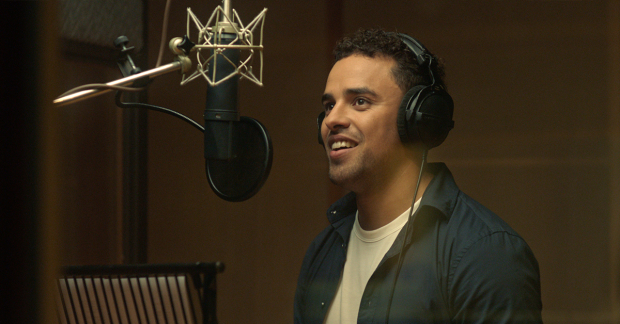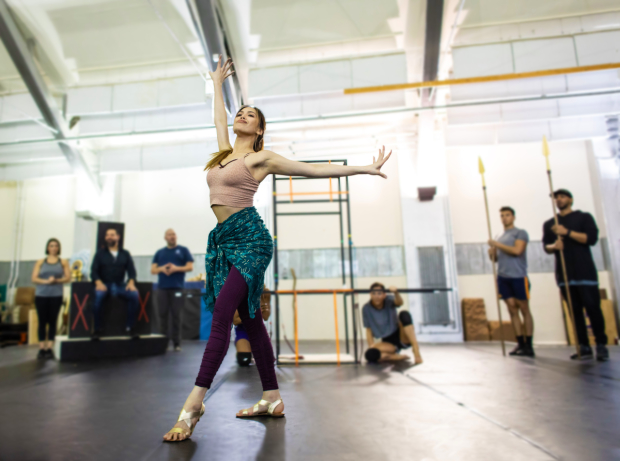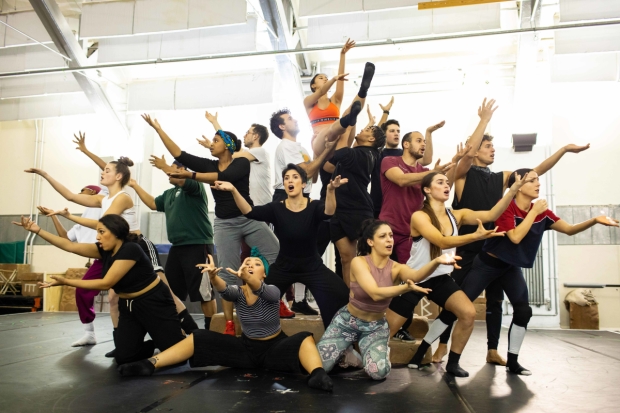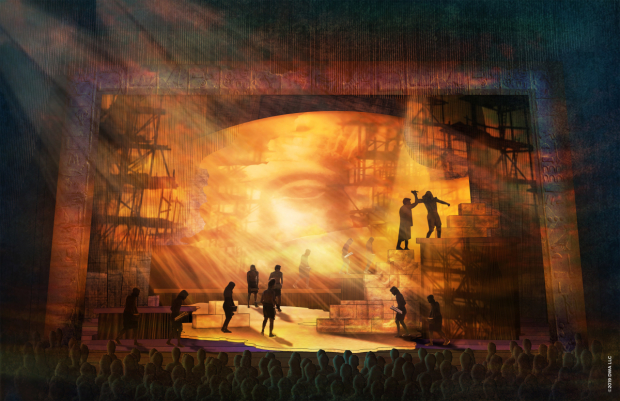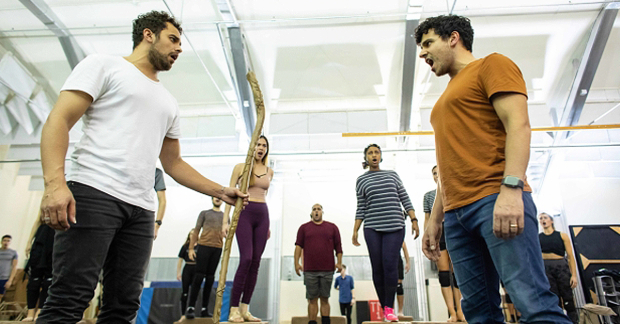Review: The Prince of Egypt (Dominion Theatre)
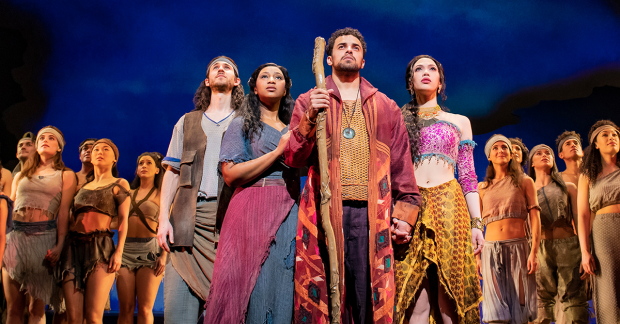
© DWA LLC, photo by Matt Crockett
Way back in 1998, The Prince of Egypt won the hearts of audiences (and Academy voters) on the big screen, at the time becoming the highest-grossing non-Disney animated movie in history and bagging an Oscar for composer Stephen Schwartz's number one anthem "When You Believe".
Amassing a legion of fans in the years since, its journey to the London stage has been a multi-national one – running first in California in 2017 before hopping over to Denmark, with Schwartz re-crafting and remoulding the production in the process. With a cast of West End regulars in tow, it now lands in the rather gargantuan Dominion Theatre.
For anyone unfamiliar with the Exodus story (told largely without deviation here) it follows the child of a slave Hebrew family, Moses, who is adopted by the Pharaoh as a proxy son. A couple of decades later Moses discovers his true heritage and runs off to seek a new purpose in life, only to realise that, after a divine visitation, his mission is to free the enslaved Hebrews and deliver them to a promised land. The plot is almost the opposite of Schwartz's long-running West End blockbuster Wicked. In that, two rivals come together as sisters to defeat a malignant force, while in The Prince of Egypt the two brothers, Moses and his king-in-waiting older brother Ramses, are wrenched apart by providence and have to see themselves as rivals.
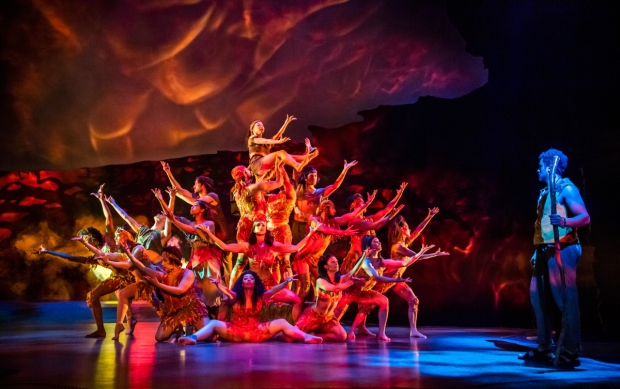
© DWA LLC, photo by Tristram Kenton
Book writer Philip LaZebnik has been neatly innovative with his original and more straightforward screenplay. By adding a few extra scenes and dialogue, he makes the Pharaoh's power far less absolute, creating a murky world where pragmatic decisions have to be taken to appease warring families craving Egypt's throne. It's also a zealously secular adaptation of the film – the 10 Commandments and Mount Sinai moments are omitted, while God is rarely given a look-in.
The biggest problem cutting through the overall production is LaZebnik's clunky dialogue, where the order of the day is very much 'tell' rather than 'show'. Subtlety and nuance are eschewed in favour of melodramatic bluntness, with the earlier part of the show, before Moses knows his real identity, dragging considerably. Thankfully LaZebnik lets the pace quicken in the second act as the plagues set in and Moses battles to free his people.
It's a sheer force of will by an utterly stand-out cast that ultimately wins the day – you're unlikely to find a more pitch-perfect cast in the West End. There isn't really a weak link – Christine Allado (Tzipporah, a gutsy, charming foil and ultimate love interest for Moses) and Alexia Khadime (Moses' sister and unwavering believer Miriam) do Whitney Houston and Mariah Carey proud with an incredible rendition of "When You Believe" towards the end of act two, bringing to life one of Schwartz's most iconic and rousing tunes with ease. Liam Tamne has a multi-faceted take on the tortured and conflicted Ramses (a different iteration to Ralph Fiennes' more clean-cut baddie in the movie), and if it even needs saying, Tamne also has a cracking voice to boot. His ruthless on-stage wife Nefertari (Tanisha Spring) gets a moment to shine with the carefully crafted new number "Heartless".
Luke Brady, who may not have as many West End credits as his opposite Tamne (though was a fine Anthony in the Michael Ball-led Sweeney Todd) holds the show together with a near-Herculean power. Almost never off stage, he has 14 numbers to power through, hopping across the rubble and beige sand of Kevin Depinet's set. How he manages week-in week-out may well be proof of a higher presence after all – his charged rendition of "All I Ever Wanted" is a particular highlight.
Which brings us to Schwartz's tunes. The composer has added ten brand new numbers to the five from the original movie ("Playing with the Big Boys Now" is transformed into the more kaleidoscopic and frantic "The Plagues"). It's the oldies that are still very much the goodies, and the majority of new ones are largely unmemorable. Some of the lyrics are also pretty basic ("The Nile has turned to blood!") but when the show alights on one of the original 1998 classics (or one of their many reprises) everything is shot through with a surge of hair-raising joy and brim. It's worth stating that the near-score-large orchestra overseen by Dave Rose sounds awe-inspiring, meaning the absence of Hans Zimmer's stirring film score is barely noticed. It was heartwarming to see dozens of punters walking down and watch the orchestra after the curtain call.
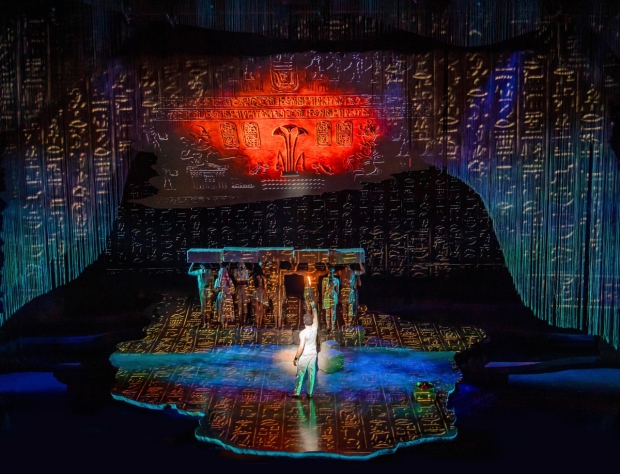
© DWA LLC, photo by Tristram Kenton
If the numbers themselves are a sometimes patchy bunch, then Sean Cheesman's choreography is simply divine – the chorus transforming into a writhing mass of tortured limbs (especially during opening number and instantly catchy "Deliver Us") or shimmering with unquenchable energy during showstopper "Through Heaven's Eyes" (led by the magnificent Gary Wilmot, who feels somewhat underused as Tzipporah's serene father Jethro).
Director Scott Schwartz (the apple never falls far from the burning bush with the son of the composer overseeing his father's show) knows when and more importantly, when not to deliver some epic set pieces. Schwartz the younger often prioritises ensemble-led movement over technical wizardry, especially during the iconic cave sequence where Moses is visited by God, or the gripping passage as the ten plagues rain down on the people of Egypt. That isn't to say that the show doesn't have tricks up its sleeve – Adam Pearce's high priest Hotep gets to pull off a few magical illusions, while Jon Driscoll's finely wrought projections blossom out from the stage and into the auditorium. They're a versatile way of ramping up the spectacle with statues of ancient kings looming out over stalls. Only an epic production in the Dominion would have the means of throwing burning comets down onto its cast.
There are some odd decisions, like adding fire effects during the climax of act one but not during the burning bush scene, but the moment you give yourself over to the production and let it take you on its merry way, it's hard not to get swept up in the overblown theatricality of everything on offer.
Musicals that go into the Dominion Theatre have a tendency to part critics like the Red Sea (see We Will Rock You, or Bat Out of Hell) and it's entirely likely that The Prince of Egypt will do the same. But anyone who fell in love with the animated DreamWorks classic in the last 20 years (as this critic very much did) will not leave disappointed – much in the same way that Disney's Aladdin or The Lion King musicals are often an ode to their silver screen counterparts. It may not work miracles, but as a stage version of an animated classic, The Prince of Egypt delivers in spades.



